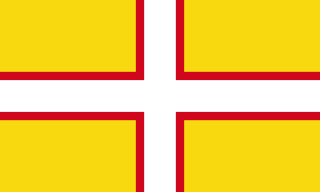
Dorset is a county in South West England on the English Channel coast. The ceremonial county comprises the unitary authority areas of Bournemouth, Christchurch and Poole and Dorset. Covering an area of 2,653 square kilometres (1,024 sq mi), Dorset borders Devon to the west, Somerset to the north-west, Wiltshire to the north-east, and Hampshire to the east. The county town is Dorchester, in the south. After the reorganisation of local government in 1974, the county border was extended eastward to incorporate the Hampshire towns of Bournemouth and Christchurch. Around half of the population lives in the South East Dorset conurbation, while the rest of the county is largely rural with a low population density.

Shaftesbury is a town and civil parish in Dorset, England. It is situated on the A30 road, 20 miles west of Salisbury, near the border with Wiltshire. It is the only significant hilltop settlement in Dorset, being built about 215 metres above sea level on a greensand hill on the edge of Cranborne Chase.

The Tolpuddle Martyrs were six agricultural labourers from the village of Tolpuddle in Dorset, England, who, in 1834, were convicted of swearing a secret oath as members of the Friendly Society of Agricultural Labourers. They were arrested on charges under an obscure act during a labour dispute against cutting wages before being convicted in R v Loveless and Others and sentenced to penal transportation to Australia. They were pardoned in 1836 after mass protests by sympathisers and support from Lord John Russell and returned to England between 1837 and 1839.
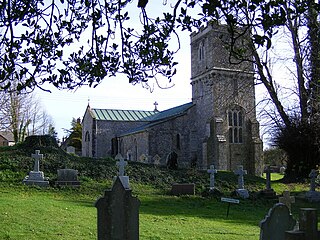
Tolpuddle is a village in Dorset, England, on the River Piddle from which it takes its name, 8 miles (13 km) east of Dorchester, the county town, and 12 miles (19 km) west of Poole. The estimated population in 2013 was 420.

Dorchester is the county town of Dorset, England. It is situated between Poole and Bridport on the A35 trunk route. A historic market town, Dorchester is on the banks of the River Frome to the south of the Dorset Downs and north of the South Dorset Ridgeway that separates the area from Weymouth, 7 miles (11 km) to the south. The civil parish includes the small town of Poundbury and the suburb of Fordington.
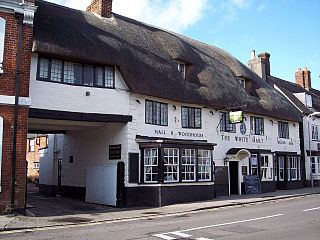
Sturminster Newton is a town and civil parish in the Blackmore Vale area of Dorset, England. It is situated on a low limestone ridge in a meander of the River Stour. The town is at the centre of a large dairy agriculture region, around which the town's economy is built. The larger part of the town (Sturminster) lies on the north side of the river, and includes most shops and services, whilst to the south is the smaller Newton. Between these two areas is a wide flood plain. The town was the home of poet and author William Barnes, and, for part of his life, Thomas Hardy. The town has 43 shops, a primary and secondary school, and a school and college catering for children with Special educational needs. In the 2011 census the town's civil parish had a population of 4,945.

Swanage is a coastal town and civil parish in the south east of Dorset, England. It is at the eastern end of the Isle of Purbeck and one of its two towns, approximately 6+1⁄4 miles (10 km) south of Poole and 25 miles (40 km) east of Dorchester. In the 2011 census the civil parish had a population of 9,601. Nearby are Ballard Down and Old Harry Rocks, with Studland Bay and Poole Harbour to the north. Within the parish are Durlston Bay and Durlston Country Park to the south of the town. The parish also includes the areas of Herston, just to the west of the town, and Durlston, just to the south.

West Dorset was a local government district in Dorset, England. Its council was based in Dorchester. The district was formed on 1 April 1974, under the Local Government Act 1972, and was a merger of the boroughs of Bridport, Dorchester and Lyme Regis, along with Sherborne urban district, and the rural districts of Beaminster, Bridport, Dorchester and Sherborne.
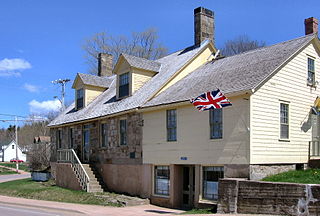
Dorchester is a village and shire town in Westmorland County, New Brunswick, Canada. It is named for Guy Carleton, 1st Baron Dorchester, an 18th-century Governor-General of the old Province of Quebec.

Puddletown is a village and civil parish in Dorset, England. It is situated by the River Piddle, from which it derives its name, about 4.5 miles (7 km) northeast of the county town Dorchester. Its earlier name Piddletown fell out of favour, probably because of connotations of the word "piddle". The name Puddletown was officially sanctioned in the late 1950s. Puddletown's civil parish covers 2,908 hectares and extends to the River Frome to the south. In 2013 the estimated population of the civil parish was 1450.
Weymouth and Portland District Council in Dorset, England existed from 1973 to 2019. One-third of the council was elected each year, followed by one year where there was an election to Dorset County Council instead. The council was abolished and subsumed into Dorset Council in 2019.

The Dorset County Museum is located in Dorchester, Dorset, England. Founded in 1846, the museum covers the county of Dorset's history and environment. The current building was built in 1881 on the former site of the George Inn. The building was designed specifically to house the museum's collection and is in the neo-Gothic style.

Portland Bill Lighthouse is a functioning lighthouse at Portland Bill, on the Isle of Portland, Dorset, England. The lighthouse and its boundary walls are Grade II Listed.
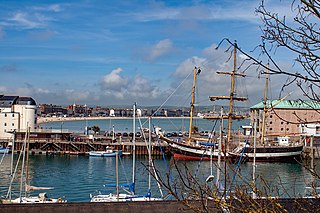
Weymouth is a seaside town in Dorset, on the English Channel coast of England. Situated on a sheltered bay at the mouth of the River Wey, 11 kilometres (7 mi) south of the county town of Dorchester, Weymouth had a population of 53,068 as of 2018. It is the third largest settlement in Dorset after Bournemouth and Poole.

Comrades is a 1986 British historical drama film directed by Bill Douglas and starring an ensemble cast including Robin Soans, Phil Davis, Keith Allen, Robert Stephens, Vanessa Redgrave and James Fox. Through the pictures of a travelling lanternist, it depicts the story of the Tolpuddle Martyrs, who were arrested and transported to Australia in 1834 for trying to improve their conditions by forming an early form of trade union.

There are several cottages associated with the Tolpuddle Martyrs. Most are in Tolpuddle in Dorset while one is in Essex.

The County Hall is a municipal facility at Colliton Park in Dorchester, Dorset.
George Loveless was a British Methodist preacher and a leader of a group of six agricultural workers who became known as the Tolpuddle Martyrs.
The Hardy Players (1908–1928) was an amateur theatrical company, based in Dorchester, Dorset. The novelist Thomas Hardy adapted his novels for live performance in collaboration with the group. In some cases he made major changes to the story, such as changing the ending of The Trumpet Major, truncating Return of the Native and making other changes to the text to better fit dramatisation. Hardy wrote his play The Famous Tragedy of the Queen of Cornwall specifically to be performed by the Hardy Players.
The Tolpuddle Martyrs' Tree is a sycamore tree in the village of Tolpuddle, Dorset. The tree is approximately 336 years old. It has become associated with the birth of the trade unionist movement.

















